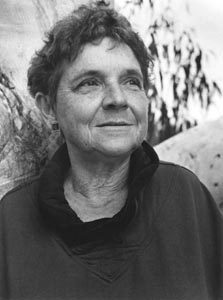![[MetroActive Books]](/gifs/books468.gif)
[ Books Index | Metro Santa Cruz | MetroActive Central | Archives ]
Rich Material
Adrienne Rich explores horror and hope in 'Midnight Salvage'
By Traci Hukill
LAST SUMMER amid droning reports of dark stains and air strikes, poetry made national news. Adrienne Rich, ringing voice of a restive female generation, author of 15 volumes of poems, recipient of Guggenheims and National Book Awards, flatly refused a National Medal for the Arts from the White House.
"There is no simple formula for the relationship of art to justice," she wrote in a letter addressed to National Endowment for the Arts secretary Jane Alexander. "But I do know that art--in my own case the art of poetry--means nothing if it simply decorates the dinner table of power which holds it hostage."
Rich is 70 this year. Her criticism of a cynical administration that has blessed a swiftly widening gap in wealth and power is assurance that time has not mellowed her craving for justice. Her newest book, Midnight Salvage, seals that certainty. In 14 poems she examines war, hypocrisy and isolation in unsparing light with the cerebral composure that once prompted poet W.H. Auden to comment, "[W]hatever she writes shall, at least, not be shoddily made."
"Midnight Salvage," written a year before Rich's letter of refusal, presages that letter's bitterness. "Had never expected hope would form itself/completely in my time ..." she writes, "But neither was expecting in my time/to witness this :: wasn't deep/lucid or mindful you might say enough/to look through history's bloodshot eyes/into this commerce this dreadnought wreck cut loose/from all vows, oaths, patents, compacts, promises ::/To see/not O my Captain/fallen cold & dead by the assassin's hand/but cold alive & cringing :: drinking with the assassins."
Rich looks hard at torture, oppression and war, visiting battlefields and cells like a ghost returning to the scene of death. And she turns her eye on the intellectual traditions that foster war. In "A Long Conversation" she criticizes the dismissal of Marxism and the ennui that permeates casual theorizing: "What is the use of studying philosophy if all that it does for you is enable you to talk with some plausibility about some abstruse questions of logic, etc. ... & if it does not improve your thinking about the important questions of everyday life ...?"
One troubling aspect of the book is the tone of Rich's introspection. Occasionally she emerges mildly hopeful from her trips to the interior labyrinth, but it's usually a numb, fatigued hope. "Midnight Salvage" ends with a reference to "Orion," Rich's 1969 poem in which a fierce and stifled young mother gazes up at the constellation and fixes her artistic yearning on it. The new poem reads, "Unstupefied not unhappy/we braise wild greens and garlic feed the feral cats/and when the fog's irregular documents break open/scan its fissures for young stars/in the belt of Orion."
Coming as it does after an exhaustive chronicle of disappointments and complications, the final verse seems to say that the best that can be hoped for is the continuation of life from day to day, and the grace of poetry to keep appearing.
[ Santa Cruz | MetroActive Central | Archives ]
Copyright © Metro Publishing Inc. Maintained by Boulevards New Media.
![]()
 Rich Enough: Acclaimed poet Adrienne Rich reads on Friday at UCSC.
Rich Enough: Acclaimed poet Adrienne Rich reads on Friday at UCSC.
Adrienne Rich reads from Midnight Salvage UCSC's Mainstage Theater on Friday at 8pm. Tickets are $16/$13/$10. For more info, call 459-2159.
From the February 3-10, 1999 issue of Metro Santa Cruz.